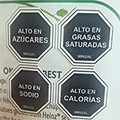
Despite extensive product reformulation after Chile began requiring warning labels on the front of less-healthy food and drink packages, Chilean consumers saw no significant change in food and beverage prices associated with the policy in the first year and a half. This was the main finding of a new study from researchers at Universidad Adolfo […]


